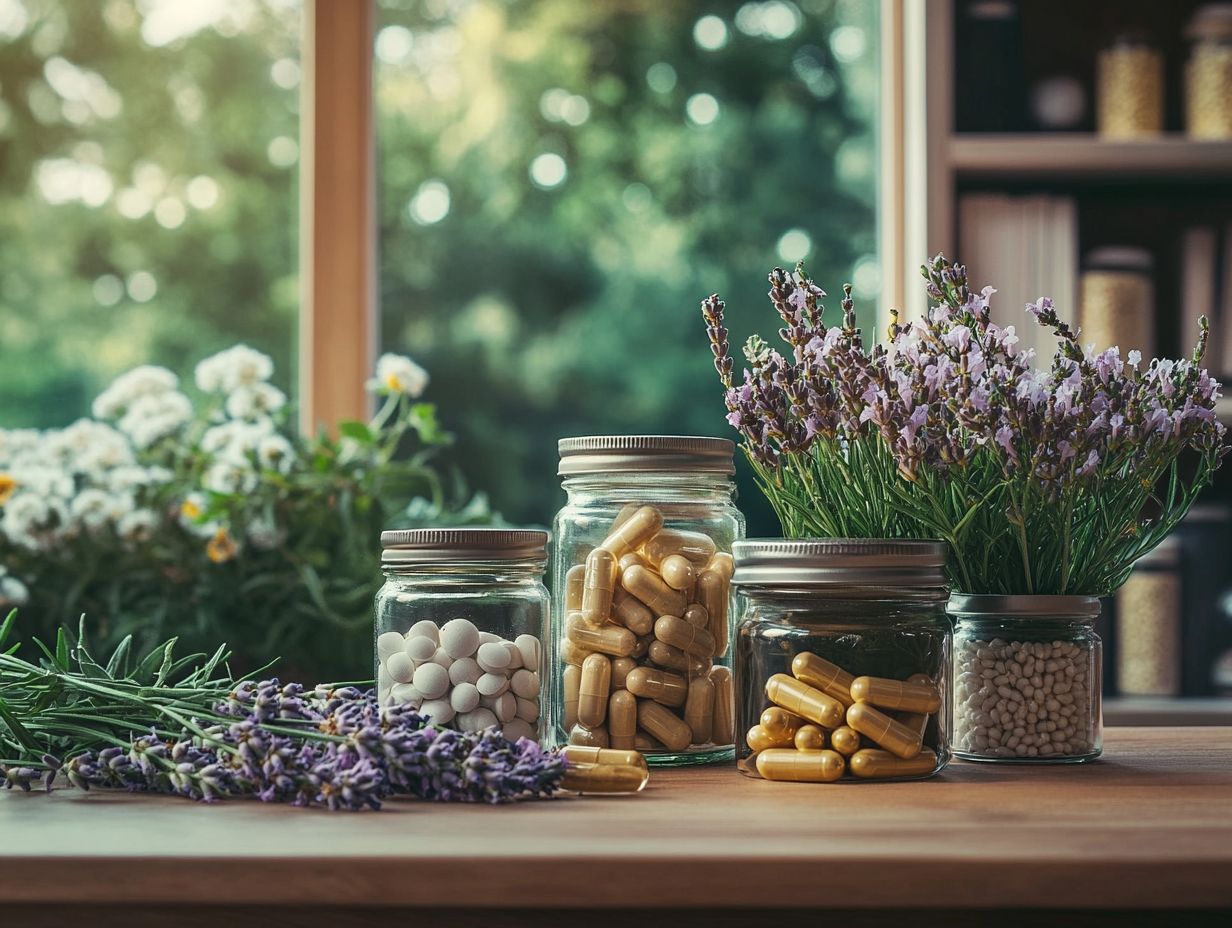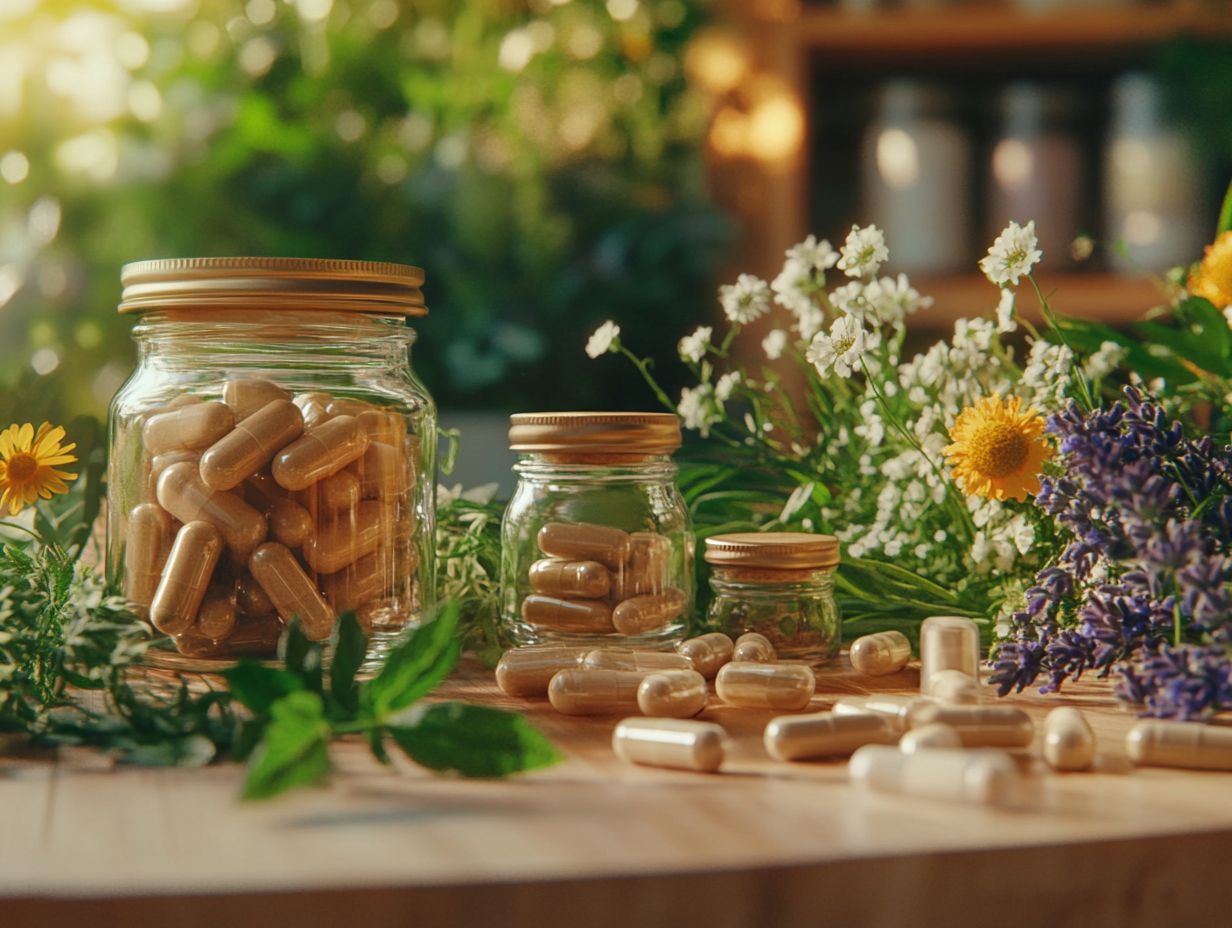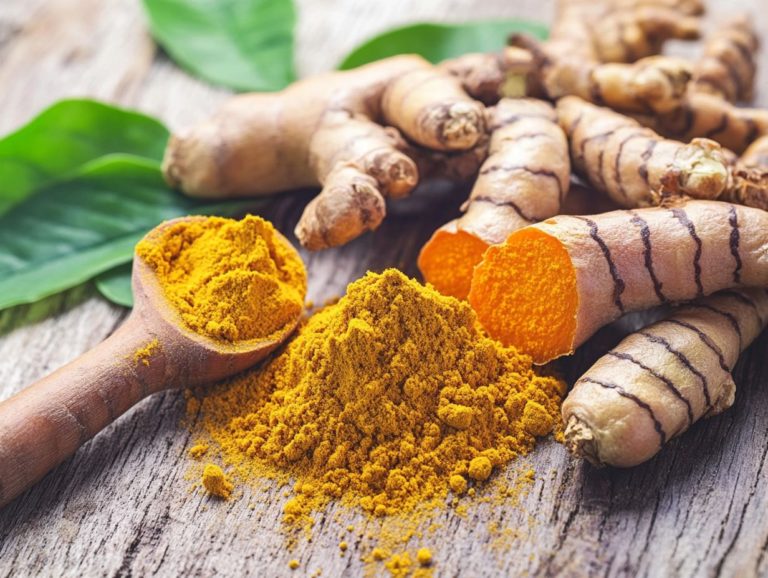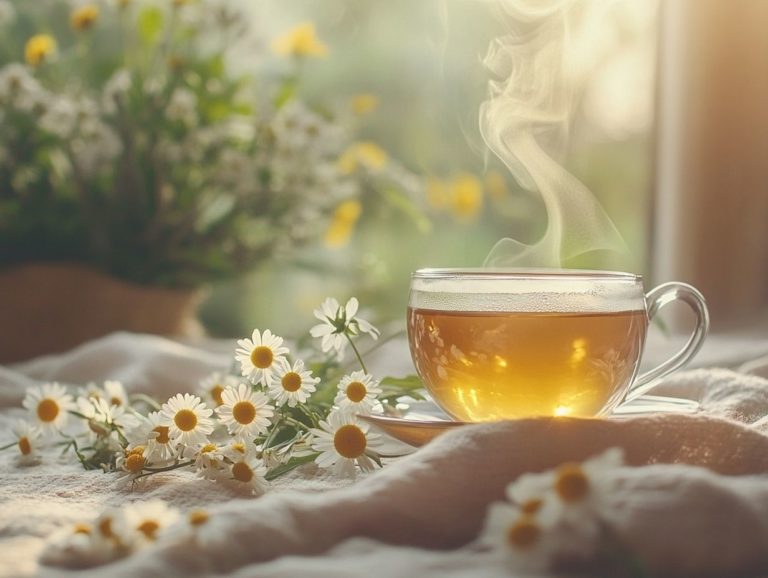7 Natural Supplements for Anxiety Management
Anxiety can feel like an insurmountable wave. Nature provides a wealth of remedies designed to soothe both mind and body.
This article explores seven natural supplements that are effective in reducing anxiety. Discover what anxiety is, its various types, and how these supplements work.
The piece details recommended dosages, potential side effects, and practical tips for integrating these calming aids into your daily routine.
Uncover the transformative potential of nature. Learn how to cultivate a sense of peace in your life.
Contents
- Key Takeaways:
- 1. Lavender
- 2. Ashwagandha
- 3. Valerian Root
- 4. Chamomile
- 5. Lemon Balm
- 6. Passionflower
- 7. Kava
- What Is Anxiety and How Can Natural Supplements Help?
- What Are the Different Types of Anxiety?
- How Do These Natural Supplements Work?
- What Are the Recommended Dosages for Each Supplement?
- Are There Any Potential Side Effects?
- Can These Supplements Be Used in Conjunction with Other Anxiety Treatments?
- How Can One Incorporate These Supplements into Their Daily Routine?
- Frequently Asked Questions
- What are the top 7 natural supplements for anxiety management?
- What is ashwagandha and how does it help with anxiety?
- How does chamomile benefit those with anxiety?
- What is the recommended dosage for valerian root for anxiety management?
- Can passionflower be used with other anxiety medications?
- Are there side effects of using kava for anxiety management?
- Can lavender be taken orally for anxiety management as part of your diet?
Key Takeaways:

- Lavender is a versatile and calming natural supplement that can help reduce anxiety and promote relaxation.
- Ashwagandha, a herb that helps the body adapt to stress, can balance stress hormones and improve your mood.
- Valerian root is a sedative herb that can help reduce the severity and frequency of anxiety symptoms.
1. Lavender
Lavender is renowned for its calming effects and potential to alleviate anxiety. It’s an excellent option for anyone seeking natural supplements to help manage anxiety symptoms.
With its soothing aroma, lavender is easily incorporated into various forms think essential oils, teas, and capsules. This offers a holistic approach to your wellness journey.
Historically, lavender has been used in traditional herbal medicine for centuries. It provides aromatic delights and therapeutic benefits.
Research backs its effectiveness. A clinical study from the University of Queensland revealed that inhaling lavender essential oil significantly reduced anxiety levels.
The proposed mechanisms include modulation of the body’s stress response and mood enhancement through interactions with neurotransmitters like serotonin and dopamine.
Numerous studies highlight lavender’s capacity to alleviate both physical and emotional symptoms linked to anxiety disorders.
2. Ashwagandha
Ashwagandha is widely celebrated for its remarkable ability to manage stress and ease anxiety symptoms. It s a go-to choice for those seeking natural supplements for mental health support.
This ancient root has a rich history in Ayurvedic medicine. It is used to reduce tension and boost energy.
Clinical studies indicate that ashwagandha may effectively lower cortisol levels, the hormone linked to stress, promoting a more serene state of mind.
For optimal results, consider a daily dosage of 300 to 600 mg of standardized extract. Be aware of potential side effects, which might include digestive issues or drowsiness.
Ashwagandha is gaining popularity in holistic health practices. It complements therapies aimed at improving both mental and physical well-being.
3. Valerian Root
Valerian root is celebrated for its role as a natural sleep aid and anxiety relief supplement. It is often recommended for individuals struggling with anxiety disorders and chronic fatigue. Its calming effects arise from its influence on the central nervous system, making it a key player in many wellness strategies.
This herb has a rich legacy, dating back to ancient Roman and Greek cultures. It was frequently prescribed to encourage relaxation and enhance sleep quality. The therapeutic benefits of valerian are largely attributed to its active compounds, including valerenic acid and various antioxidants.
For those aiming to improve their sleep patterns or manage anxiety, consider taking 300-600 mg of valerian extract before bed. Also, be aware of potential side effects such as dizziness or stomach upset. It’s wise to consult with healthcare professionals, especially if you are taking other medications, to avoid any undesired interactions.
4. Chamomile
Chamomile is a gentle yet effective herbal remedy for soothing anxiety symptoms and promoting relaxation. Whether enjoyed as a comforting tea or in supplement form, its calming effects offer therapeutic relief from stress and contribute significantly to your overall emotional wellness.
Rich in flavonoids like apigenin, chamomile interacts with receptors in the brain that help calm you down, mimicking the tranquil effects of certain medications. Numerous studies, including one randomized clinical trial, revealed that participants who took chamomile extract reported decreased anxiety symptoms compared to those given a placebo.
While chamomile is generally safe, be aware that mild side effects, such as drowsiness or gastrointestinal disturbances, can occasionally occur. Imagine unwinding with a warm cup of chamomile tea after a hectic day! Consider starting your morning with this soothing beverage or take it as a supplement in the evening to help you unwind.
5. Lemon Balm

Lemon balm, a delightful member of the mint family, has long been celebrated for its soothing properties and remarkable ability to alleviate anxiety and stress. For those seeking natural supplements, it s an exceptional choice. Its calming effects can greatly support your emotional stability and contribute to a balanced mood.
Known scientifically as Melissa officinalis, this versatile herb has a rich history. It was valued in ancient civilizations for both its culinary appeal and medicinal benefits. Traditionally, it was used to calm nerves, enhance digestion, and improve sleep quality. The magic lies in its active compounds, like rosmarinic acid and citronellal, believed to offer neuroprotective advantages.
Recent clinical studies support these age-old claims, showing significant reductions in anxiety levels among participants. For optimal results, a typical dosage of 300-600 mg of lemon balm extract is often recommended. However, it s essential to consider potential interactions with other treatments, especially sedatives and anticoagulants, to ensure safety and efficacy.
6. Passionflower
Passionflower is famous for its ability to calm anxiety and improve sleep. It s a valuable herbal remedy for anyone facing anxiety disorders or emotional challenges. Its unique compounds help your body handle stress better, creating a sense of tranquility that many seek.
Recent clinical studies show that extracts of this flower can lower anxiety levels and improve sleep quality, often with fewer side effects than traditional medications. Recommended dosages typically range from 250 to 500 mg of dried extract, tailored to your individual needs and the intensity of your symptoms.
While generally considered safe, pay attention to potential side effects like dizziness or drowsiness. You can integrate passionflower into your holistic stress management routine by taking supplements or enjoying herbal teas. Complement these with mindfulness practices like meditation and deep-breathing exercises for a comprehensive approach to your mental well-being.
7. Kava
Kava, sourced from the root of the kava plant, is known for its ability to promote relaxation and alleviate anxiety. This traditional beverage, cherished in various cultures for its ceremonial practices, offers mood-enhancing properties that can provide significant relief for those dealing with anxiety disorders.
The use of kava goes back centuries in Pacific Island cultures, where it has been a staple in social rituals and gatherings. This fosters community and eases tension. The plant’s active compounds, called kavalactones, interact with neurotransmitter systems in the brain, specifically targeting GABA receptors, which help calm the brain and are crucial for regulating mood and anxiety levels.
Recent research backs these claims, showing that kava can effectively reduce anxiety symptoms without the sedative effects typically associated with pharmaceutical options. However, while kava presents potential benefits, you should be mindful of possible side effects, such as liver toxicity, gastrointestinal issues, and dizziness, especially when consumed in large amounts or alongside alcohol.
Therefore, following recommended dosage guidelines is essential to minimize risks and maximize the benefits of this unique plant.
What Is Anxiety and How Can Natural Supplements Help?
Anxiety is a mental health condition that manifests as excessive worry and fear, affecting both your emotional state and physical health. It can influence your daily life and overall well-being. Natural supplements have become popular as a viable alternative or complement to traditional treatments like psychotherapy and antidepressants. They may offer you therapeutic relief and enhance your wellness.
Supplements come in various forms, including herbal remedies like chamomile, well-known for its calming effects, and passionflower, which may help ease anxiety. Additionally, navigating anxiety with natural remedies can include nutrients like magnesium and vitamin D, which play an important role in mood regulation and brain health. For example, magnesium has been linked to anxiety reduction, while a deficiency in vitamin D has been associated with heightened anxiety symptoms.
It’s crucial to ensure that any claims surrounding these supplements are supported by evidence-based research to verify their safety and efficacy. This highlights the importance of consulting healthcare professionals before incorporating them into your routine.
What Are the Different Types of Anxiety?
Anxiety disorders encompass a variety of conditions, including generalized anxiety disorder, panic disorder, and social anxiety disorder. Each presents its own set of symptoms and challenges. Understanding these different types is essential for crafting effective stress management and treatment strategies.
For instance, generalized anxiety disorder often manifests as persistent worrying about everyday matters. Panic disorder is characterized by sudden, intense episodes of fear that can lead to physical symptoms like heart palpitations or shortness of breath. Social anxiety disorder involves an overwhelming fear of social interactions, resulting in avoidance behaviors that can significantly disrupt your daily life.
Understanding these treatments can change your life! The implications for treatment are considerable, as each disorder may require a personalized plan. This means a strategy tailored to individual needs, incorporating therapy, medication, and lifestyle modifications. Recently, natural supplements like chamomile, valerian root, and magnesium have gained attention for their potential benefits.
These supplements complement integrative medicine practices that promote holistic healing methods. Start your journey to a calmer life today!
How Do These Natural Supplements Work?

Natural supplements operate by fine-tuning your body’s stress response, engaging brain chemicals, and fostering relaxation. This provides therapeutic relief from anxiety symptoms and stress response. By understanding their mechanisms, you can select the natural remedies for general anxiety relief that best meet your specific needs.
Take ashwagandha, for example. This remarkable herb is known for lowering cortisol levels, the stress hormone, while also boosting the production of gamma-aminobutyric acid (GABA), a brain chemical that helps calm your nervous system. Clinical studies have shown that incorporating ashwagandha and L-theanine into your routine can lead to significant reductions in anxiety scores and notable improvements in your overall mental well-being.
Magnesium is an essential mineral that helps nerve function. It has been shown to alleviate stress by regulating neurotransmitter release and promoting a soothing effect on the nervous system. Research indicates that magnesium supplementation can significantly lower anxiety levels and improve mood stability.
By leveraging these insights, you can make informed choices about the natural supplements that will best support your journey toward greater peace of mind and stress resilience.
What Are the Recommended Dosages for Each Supplement?
Determining the recommended dosages for natural supplements is essential for maximizing their benefits while ensuring your safety. The effective doses can vary based on individual factors and the specific supplement in question. Adhering to guidelines rooted in evidence-based research is key for optimal anxiety management.
It’s important to know that factors such as age, weight, diet, and existing health conditions can significantly influence these dosage recommendations. For instance, if you have certain medical histories, you may need to adjust standard dosages to avoid any adverse interactions.
Therefore, before embarking on any new supplement regimen, talking with a healthcare professional is a smart move. They can offer personalized advice and ensure that your chosen supplements align with your unique risk factors, ultimately enhancing both efficacy and safety in managing anxiety.
Are There Any Potential Side Effects?
While natural supplements can be beneficial for managing anxiety, it s crucial to be aware of the potential side effects of dietary supplements that might arise from their use. Understanding these risks enables you to make informed decisions and ensures your safety.
Common side effects linked to various natural supplements may include digestive issues, headaches, and even allergic reactions. Pay close attention to how your body responds once you start a new supplement. Taking proactive steps, such as consulting with a healthcare professional, can help minimize risks especially if you are also on prescribed medications.
Choosing products that undergo thorough testing by independent companies can significantly enhance your safety. Be vigilant, as signs of adverse reactions can range from mild discomfort to more serious symptoms like a rapid heartbeat or mood changes, indicating the need for immediate evaluation.
Can These Supplements Be Used in Conjunction with Other Anxiety Treatments?
Integrating natural supplements with traditional anxiety treatments, such as psychotherapy and antidepressants, can enhance your overall treatment outcomes. Exploring natural remedies for social anxiety offers a comprehensive approach that enables more effective management of anxiety disorders.
It’s vital to collaborate closely with your healthcare providers to develop tailored wellness strategies that meet your unique needs.
As you explore the potential benefits of this integrative approach, consider how various natural supplements like omega-3 fatty acids or herbal remedies might interact with your prescribed medications. These interactions can amplify therapeutic effects or lead to unwanted side effects, making professional guidance critical.
Many individuals have reported a notable reduction in anxiety levels when using specific adaptogens alongside conventional treatments. Adaptogens are natural substances that help your body manage stress. Maintaining an ongoing dialogue with your healthcare professionals ensures that your treatment journey remains both safe and effective.
How Can One Incorporate These Supplements into Their Daily Routine?
Incorporating natural supplements into your daily routine requires thoughtful planning and consideration of your unique health needs. For example, utilizing natural sleep aids to alleviate anxiety ensures that they effectively contribute to anxiety management and enhance your overall wellness.
Establishing a consistent regimen fosters positive outcomes and builds resilience against stress. To maximize effectiveness, pay attention to the timing of your supplements, especially with dietary approaches. Taking them with meals can improve absorption, while certain options, like magnesium, may be best utilized in the evening to promote relaxation.
Pairing supplements with mindfulness practices such as meditation or deep-breathing exercises creates a holistic approach to managing anxiety. Engaging in physical activity, like yoga or brisk walking, complements the benefits of supplements, helping to lower stress hormones and elevate your mood.
By fostering this synergistic lifestyle, you not only support your emotional wellness but also encourage a more balanced and fulfilling daily experience.
Frequently Asked Questions

What are the top 7 natural supplements for anxiety management?
The top 7 natural supplements for anxiety management are: ashwagandha, chamomile, valerian root, passionflower, lemon balm, kava, and lavender. For more information on natural ways to manage anxiety attacks, consider exploring these remedies.
What is ashwagandha and how does it help with anxiety?
Ashwagandha is an herb commonly used in Ayurvedic medicine. It helps reduce anxiety by lowering cortisol levels and promoting relaxation.
How does chamomile benefit those with anxiety?
Chamomile is a calming herb that can help reduce anxiety symptoms such as restlessness and insomnia. It promotes relaxation and can also help soothe digestive issues often associated with anxiety.
What is the recommended dosage for valerian root for anxiety management?
The recommended dosage for valerian root for anxiety management is 300-600 mg taken 30 minutes to an hour before bedtime. It may cause drowsiness, so it is best to take it at night.
Now that you know the top supplements, consider discussing them with your healthcare provider!
Explore these supplements today and take the first step toward managing your anxiety!
Can passionflower be used with other anxiety medications?
Yes, passionflower is generally safe to use with other anxiety medications. Always consult a healthcare professional before adding supplements to your medications.
Are there side effects of using kava for anxiety management?
Kava may cause mild side effects like headaches, stomach upset, and dizziness. Kava can interact with some medications. Talk to a healthcare professional before using it.
Can lavender be taken orally for anxiety management as part of your diet?
Yes, you can take lavender in supplements or tea for anxiety relief. Discover the calming power of lavender! You can also use the scent to help you relax.






